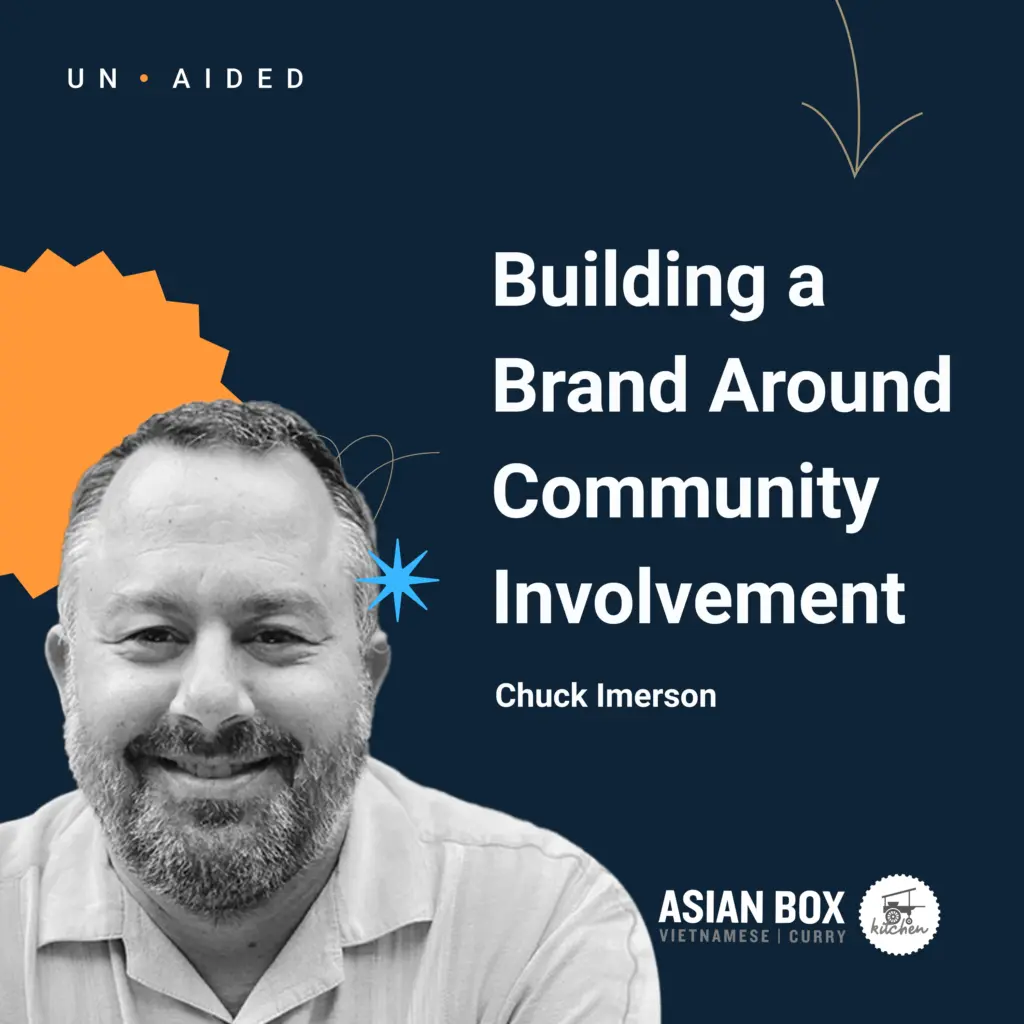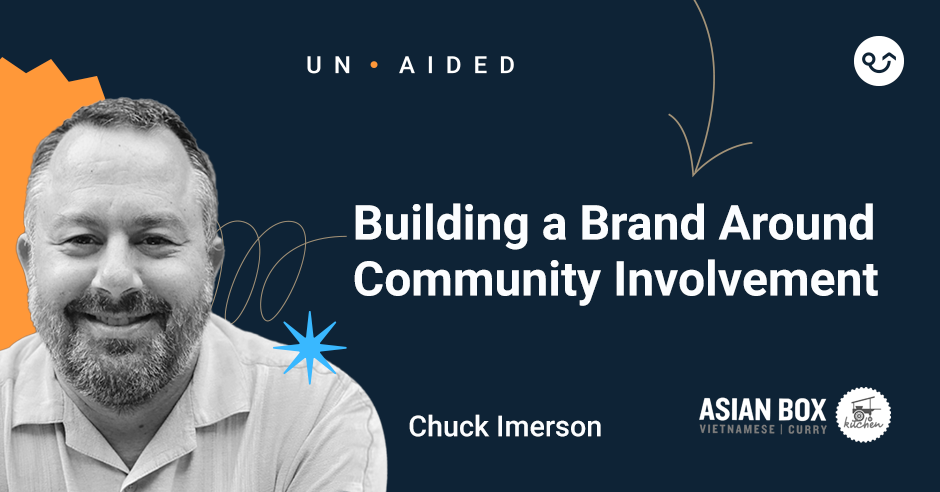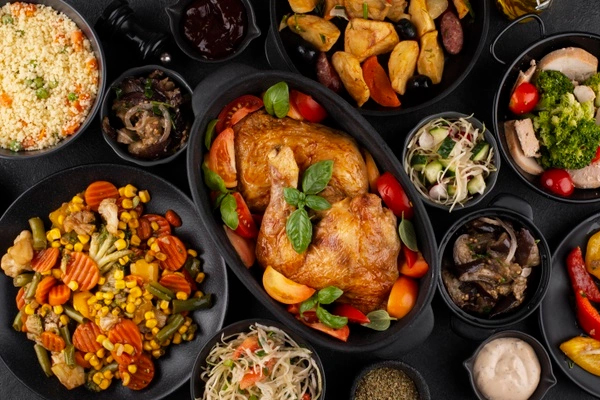
The Culture Of Giving Back: On Asian Box’s Community-Involvement And Leadership With Chuck Imerson
Posted in:

Success is best shared. Every successful business owner knows this to be true, and Evan Brandoff has the guest to prove that in this episode. He interviews Chuck Imerson, the CEO of Asian Box, about the business processes in his fast-casual Vietnamese restaurant and, more importantly, about how the culture of giving back impacts the community around your business as well. Chuck has been guiding Asian Box as they navigate the difficulties of running the business during COVID while continuing to change their employees’ lives and amplify their work with the community. With all the unique flavors, mix and match concepts, and everything in between, you’ll surely gain a lot of tips and insights in this conversation! Tune in to help you grow your business too in the greatest way possible.
—
Watch the episode here:
Listen to the podcast here:
The Culture Of Giving Back: On Asian Box’s Community-Involvement And Leadership With Chuck Imerson
We welcome Chuck Imerson to the show. Chuck is the CEO of Asian Box, a delicious Vietnamese QSR in California. Chuck has a plethora of experience and knowledge in running successful organizations and building amazing brands, so let’s get into it.
—
Chuck, how are you? Thank you so much for coming to the show.
Thanks for having me, Evan. I appreciate it.
We are excited to chat with you. Where are you calling from?
I’m in Gilroy, California.
Chuck, for our friends that are reading that are not familiar with Asian Box, can you tell us a little bit more about Asian Box?
Asian Box is a fast-casual Vietnamese restaurant. It was founded in 2011. We’re coming up on ten years this March 2021. One of the Founders, Grace Nguyen, is Vietnamese and she created all the recipes from her family recipes. Frank and Chad, the other two founders, had this vision that there’s a hole in the market and the States with Vietnamese street food. It came from the street carts of Vietnam. That was their inspiration. They took that idea and turned it into the first restaurant in Palo Alto.
It’s driven on build-your-own and you can create your own box, however you want it. There are 275,000 combinations you can make. It has high-quality local ingredients when it can be sourced that way. We’re a step above your normal Asian-type restaurant, and Vietnamese is unique. We have added curry over the last few years and put heavy emphasis on the curry. We got out of Vietnam a little bit but we’re in Southeast Asia still as far as the flavors.
What’s your favorite combination?
I’m pretty boring. I do the noodles with chicken, a couple of the toppers like peanuts, herbs, and stuff. I mix the sriracha and the peanut sauce. A lot of people don’t know you can mix and match however you want when you come in. Part of that is mixing the sauces, so it makes unique flavors.
Chuck, I love the fact that one of the cofounders of Asian Box is the brains and the creator of the food and culinary experience. If she came over and cooked you your favorite box, how similar would it be is she, herself cooking for you versus what you get in an Asian Box store?
It’s pretty similar. The recipes are spot on to what she does around the house. I have been over to their house to eat several times. I’m a little picky, so she would have to make some modifications to get it exactly how I order it as opposed to what she would want to make.
There’s a lot of uncertainty but believe that you can still survive even in the toughest days of your business.
I noticed on the Asian Box website’s home screen that there is both a prompt where Asian Box will match a box for every box donated and also the opportunity to fundraise at the Box. Clearly, giving back is a key part of your company’s culture. What was the origination of that being a core part of your culture?
The fundraising part has always been there. For years, we gave part of our catering revenue to different organizations and that’s part of our future plans as well. We took a little pause during the pandemic on that particular thing. Fundraising with schools, clubs, and sports, we have always done those. It’s a standing opportunity that we have in all the stores with the community. The specific one where we match came from the pandemic. We saw a lot of these frontline workers giving it their all and making sacrifices. We have a couple of stores near hospitals. One of our biggest accounts is Kaiser and certainly Stanford and all parts of Stanford, including the hospital.
We wanted to try to give back. We did a whole giveaway on our own to say thank you and realized that people wanted to be part of that. We set that up where you can go on there and buy as little as 2 boxes as many as 10, get them at a discounted price, and then we will match that. If you buy five boxes for the fire department down the street, we will deliver 10 or defer 5 to somewhere else if they only need 5. That’s our piece. We’re working on fine-tuning that and making it easier to do going forward here in the near future. We’re updating that part of our website. It’s a little clunky, so we’re trying to make it as easy as possible.
Everyone and all companies should be giving back. That said, I’m curious. In addition to doing good in the community, is there a business case behind doing fundraisers like this?
I don’t necessarily know off the top of my head the answer to that question. Everywhere I have ever worked, it has been part of the culture and it’s more about that. Certainly, it’s hard to put an ROI if that’s what you’re asking. You have to believe that the community is the one that’s supporting you and wherever you can give back. Part of it is self-serving.
You get your name out there in the community but you’re supporting the schools. I have kids in school and there are fundraiser nights all the time. You want to support the businesses that are giving back to the community. The next time you go out, you make that choice and have that awareness. I do think it helps your business. I do firmly believe that but I haven’t done the case study.
That makes a lot of sense on what you’re saying. There’s a lot of data that shows 70% of consumers want to buy from brands that support their community and the 60%, their number one priority in choosing a brand is a brand that they trust.
It’s a little self-serving. The fact that there’s a reason McDonald’s sponsors the Olympics, they want their name out there and that awareness. You take that to the smaller level of a small business trying to give back to the immediate community and hopefully, people will pay that forward to you.
You have these two different incredible charity and fundraising platforms. You have made such incredible impacts on the communities that you serve. I’m curious. How do you amplify that impact? Are you taking what you’re doing and using that in your broader marketing message at all?
At this time, we haven’t. It’s more about doing it. We’re doing it because it’s the right thing to do. Our employees are in that community. They may have kids or family members that are in those hospitals that we’re trying to support the frontline. We’re fortunate enough to be in a position still open and operating after this pandemic or even as we’re still getting, hopefully, to the end of it.
We’re still standing and we want to share that when we can. To be honest, whenever we’re talking about stuff like this, I think of our Palo Alto store and the hospital is right next door. These nurses and doctors come over all the time and eat with us. It’s almost like a loyalty program where we’re giving back to them but they have given us for years. It feels good to be able to say thank you.
Thank you for doing that. What impact did COVID have on the business?

Giving Back Culture: For years we gave part of our catering revenue to different organizations, and we plan on that’s part of our future plans as well.
It was tough at first. I’m sure you have heard a thousand stories. I look back now and feel like we’re fortunate but we had to close two of our stores. We started with 10 but we lost 2. Now we have 8. We had temporary layoffs in the corporate staff. We’re fortunate to get them back pretty quickly. That was a stressful time for them, the two stores that we had to close and those employees. We took advantage of a lot of government support and we’re able to rehire the corporate people. You flash forward, we’re going to open a store in 2022 to replace 1 of the 2 that closed.
We’re using the system and hopefully, it will get us back to where we started. We have been able to employ and maintain over 100 employees through the worst of it. We’re back up to about 130 employees. Again, we feel fortunate. We did have to close two stores and had some tough and stressful moments there at the beginning. There was a lot of uncertainty. Us being fast-casual, we were set up for takeout and third-party delivery. That certainly helped us through the toughest days.
To that point, were there any positive impacts from COVID on product development or the digital experience?
We quickly made it easy for our people to order online and through technology. We already had the infrastructure there but we were able to add a couple of layers to make it even easier. A lot of our partners like SpotOn, our POS provider, stepped up and sped up the development of our app so that people could use that and those sorts of things. You get efficiencies. All of a sudden, you’re running a lot less labor. You do get an unexpected rush and figure it out. The guests were very understanding throughout it. The pre-order online and pick-up stuff became the forefront during that time.
You mentioned core values before and how giving back Asian Box’s core values, which is incredible. With 130 employees across 8 different locations, not including corporate location and a distributed team, how do you instill Asian Box’s core values across so many people in so many locations?
I look at our company through this. We didn’t lose a single manager through the pandemic. The two managers in the stores we closed, even though they were laid off for a while, they’re back. We were able to rehire them in other roles and keep them. The communication and sense of ownership that we give our managers step down to our employees, and that goes a long way. I would like to think they feel very appreciated. We do appreciate them, and we do everything that we can, certainly from simple stuff as wages and those sorts of things.
We’re certainly very competitive but it’s more the environment of coming to work, having fun, and feeling safe and appreciated. Also, having a sense of ownership, being able to ask for time off, and all those little things add up to a great work environment. We have always instilled that at Asian Box. It came to the forefront during the pandemic where we’re communicating with everybody like, “This is what’s going on.” Being honest with the stores that were closing, the stores that weren’t, and ensuring the employees understood that we weren’t going anywhere. We’re going to weather the storm, and they had a place to work.
I want to ask you about a topic that’s potentially sensitive, but I found it interesting. One of my friends owns a Chinese food franchise. As we all know, COVID came from China, which is part of Asia. He mentioned to me that there was a lot of xenophobia and more graffiti on their store and hurtful messages. Sales picked up slower for them versus other restaurants in the area because of xenophobia, which is terrible. I was mind blown when I heard that it was the case. I’m curious if you experienced any of that at Asian Box.
We didn’t, fortunately. We talked about it and thought there might be some of that. We saw some news reports of Asian businesses being targeted and that perception. It was a short period of time at the beginning of the pandemic that people, unfortunately, maybe were uneducated or didn’t have the information and made bad decisions. Fortunately, our locations, where we’re at, and the way our team communicates and is able to let people know what we’re all about, we didn’t see any of that. Certainly, there was nothing physical to the buildings or anything negative towards our staff that I’m aware of.
That makes me happy to hear. I’m super pumped they all are opening up another location in 2022. Chuck, you have been in the restaurant business since high school. Is that right?
That is correct.
How did you get into the business originally?
Build an organization where the environment is fun, safe, and employees will feel appreciated. Remember that having happy employees is crucial for your business.
They opened a restaurant where I grew up down in San Diego out in this county called PoFolks, which was at the time, a pretty popular restaurant in the South. They had a small franchise group in San Diego. It was all fried food and couldn’t be less healthy. You walk in and there are nine fryers lined up. I remember the first six months of my career, I dropped chicken into a big fryer over and over again the whole shift.
I started there and I enjoyed it. I had early success right out of high school. They promoted me to Kitchen Manager and that way, I went. I loved the business. It changes every day. You’re interacting with both the guests and your employees. It’s fun, exciting, and something that people are always going to need is to eat. It’s something that was fun and never boring.
Let’s assume, and please correct me if I’m wrong, that the quality of the food is the number one most important at a restaurant in order to drive traffic.
Yes. That’s always the discussion. The employees have to be there to make that food perfect. It’s that balance. That’s our mantra that we hang our hat on with great food quality. When it’s made right, nobody can beat it. That’s what we strive to do at every Box.
What comes next after the quality of food?
When you’re sitting there looking at how we’re going to be successful, we have to have great and happy employees that want to do a good job and take pride in that food being perfect. Service comes neck-to-neck with that. We’re fast-casual, so it’s not like you’re sitting in there for 45 minutes getting a full-service experience where you’re connecting with the server. I have been in that part of the business for a long time too and it is different. You get a short period of time when you’re coming in. They could still make a big difference on someone’s day.
That cashier is in a good place, whether it’s walking the guests through the menu, smiling, or being nice. That experience, whether it’s a 45-minute full service or a 45-second transaction at the register can still be as impactful and memorable. We have a lot of guests and regulars that come in and they will Yelp or comment to us about, “I see Chris every time I’m in there. He’s great.” We love that because people will come back for a good experience even if something else is not perfect. In a fast-casual, food quality is going to drive those people back. We’re fortunate we have great food and it holds well. It’s a good product.
You have spent time with quick service but also sit-down, fast-casual, and all different types of dining settings. How much of the skillset of leading different types of companies are transferable? What are some of the biggest differences based on the dining setting?
It’s all the same as far as leading the people. You’re working with people. It’s even transferrable to other industries, certainly because it’s about how you treat people, talk to people, train people, hold them accountable, respect them, and empower them. For me, I joke that I’m hands-off in the fact that I trust the managers and want them to make decisions.
It’s not just the managers. With our cashiers, if someone comes in and says, “I was in last week and I got peanut sauce instead of sriracha.” I want them to be able to say, “Let me get you a new box.” I want them to have that sense of ownership. I don’t want that guest to wait for the cashier to either say sorry and do nothing or go try to find a manager who might be busy. It becomes a worse experience for that guest. I want everybody on our team to be empowered to do the right thing, use common sense, take care of the customer, and give them the best experience.
If something is not right, which happens from time to time, simply make it right. When you set up systems where it’s like, “I got to check with them,” I don’t think it’s as impactful on the end experience for the guests. As far as managing twenty servers versus cashiers and cooks in a fast-casual, it’s the same. It’s taking care of people and being respectful.
That is a huge testament to your incredible leadership that there is no manager turnover. Congratulations. I need to learn more from you about leadership.

Giving Back Culture: It’s really important to give back to the community. The community is the one that’s supporting you, and wherever you can, give back.
It’s about the team. We have good people that work their way up.
What’s next for Asian Box?
We’re looking to grow in Northern California, where we started initially for the next year or so. We’re hoping to open 2 to 4 stores in the next few years and continue from there. After that, maybe we will look at another market or look to franchise. We’re in a good position coming out of this catering. The biggest and still negative holdover from the pandemic is these offices still are not full and even the ones that have people coming back are not catering as much. At the end of 2022, that piece of the business will come back, and then we will be back to pre-COVID growth and numbers.
What’s typically the impetus for franchising versus opening up more corporate-owned locations?
There are a lot of opinions on that. If you can franchise, you can grow faster theoretically with less or no capital because the franchisee is putting that money up. Certainly, it’s less risk for the company. The risk goes on the franchisee but in return, you have to have a great brand and a good system. It’s something that we have been prepared to do for a while prior to COVID. We put it on hold on purpose while we weathered the storm. We want to get back up to where we were prior to COVID as far as store numbers, and then we will revisit that. Certainly, you have the potential to grow a lot faster because you’re sharing the capital. It’s not coming directly from the company.
Is it over or under five years until we will have some Asian Boxes in Philly?
If we franchise, it could be under but if we do the corporate route, it’s over because it’s not on my list yet.
How many Asian Boxes do you want there to be in five years?
I want to double in size if we do corporate. I want to get back up and get to twenty. I want to be double where we were prior to COVID, so there’s twelve more.
I believe in you. I need to get out to Cali and try.
It holds well. I could overnight you a box. We’ll see. We’ll have to figure that out.
Have you looked into getting on Goldbelly?
When your business is great, people will come back for the great experience.
I have. We have looked at that. Our ingredients are so fresh. Some of them we’re doing shift to shift like our rolls and herbs. It makes me nervous for the next day or two days but we have talked about it. There’s technology to help that process out. Maybe some of our sauces will get out around the country before the rest of our food does. Maybe you can get some of our sauces on your homemade stuff at some point. We’ll see.
Your name is also already perfect for a subscription box. I’m sure being focused has been the key to your success. I don’t want to throw any other phrases.
We always have to have that list of things we want to get to. We have our immediate focus and long-term plan. Nothing is out of the question.
Chuck, the last phase of this episode is the lightning round where I’ve got four questions for you and you’ve got two minutes to answer all four. It’s the first thing that comes to mind. Are you ready?
I will give it my best.
First question. What’s your favorite youth sports memory?
It’s a bad memory but it’s also good. I was a terrible baseball player. I was in the right field for two innings because they had to play you a minimum of two innings. I never hit it out of the infield. One time, I thought I got a hit. I was running to first base and I got called out. I swore it was a tie base because it goes to the runner. My dad was the umpire and he called me out. I give him a hard time about that to this day. I coach my son now and fortunately, he’s a much better athlete than me, so it’s a lot more fun.
What did you want to be when you were growing up?
A baker. My grandma was a big baker, so I always had food there. I’m not a very good cook, truth be told, as my wife would attest to. Early on, I started as a cook in the business and I loved it. Baking was something I was interested in. Early on, I wanted to be a lawyer, but as it got closer to reality, it was the food business.
What is a brand whose marketing you admire most?
There are a lot of big ones out there that do a good job like Nike. Food-wise, Chipotle does a good job. They really do. Some of the stuff they have done and how they roll out new items, we pay attention to that. I don’t quite have their budget but someday, we will be able to do some of the stuff they’re doing.
What’s also impressive about Chipotle is oftentimes they don’t roll out new ingredients but there are still new menu items.

Giving Back Culture: When the food is made right, nobody can beat it.
We do that too. That’s arts and good practice.
Last question. What is your go-to cause to support?
With Asian Box, we have done a lot with Lucile Packard Children’s Hospital at Stanford. That will continue from where we’re at. We participated in some events with them and that will continue.
Chuck, I enjoyed having you on the show. You were insightful and inspirational. I’m wishing you all the best in what’s to come with Asian Box.
I appreciate the time.
—
Thank you for reading our episode with Chuck Imerson. As a recap, we discussed more Asian Box, its plans, the importance of making an impact on the communities that you serve, and more about leadership, specifically Chuck’s incredible leadership style. Thank you so much for reading. See you next time. Play on, everyone.
Important Links:
About Chuck Imerson
 Chuck Imerson is the CEO of Asian Box, a fast-casual Vietnamese restaurant. Chuck has been guiding Asian Box as they navigate the difficulties of running the business during COVID while continuing and amplifying their culture of giving back.
Chuck Imerson is the CEO of Asian Box, a fast-casual Vietnamese restaurant. Chuck has been guiding Asian Box as they navigate the difficulties of running the business during COVID while continuing and amplifying their culture of giving back.
